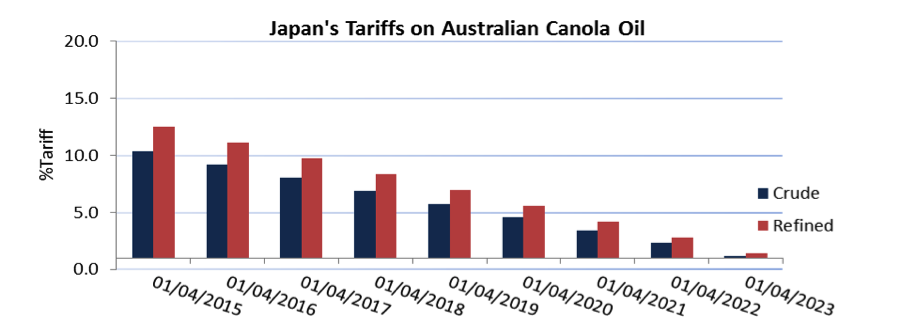Importance of the Trans-Pacific Partnership for Canola
May 13th 2015
- Achieving stable and open trade by eliminating tariffs and preventing non-tariff trade barriers is a key priority in the canola’s industry strategic plan, Keep it Coming 2025, which targets sustainable production of 52 bushels per acre to meet global market demand of 26 million metric tonnes of Canadian canola.
- More than 90% of our canola is exported as seed, oil or meal – generating $19.3 billion in economic activity annually for Canada and supporting a quarter million jobs. The TPP offers potential for;
- Removal of tariffs on canola oil and meal in key export markets such has Japan and Vietnam;
- Improved science-based rules for biotechnology; and
- Effective and predictable sanitary and phytosanitary measures.
A Trans-Pacific Partnership agreement is imperative
Value added canola exports could increase significantly from an ambitious TPP
- A successful and ambitious TPP would be a major win for the entire canola value chain including the 43, 000 farmers that grow the crop of which 9000 are based in Manitoba, as well as life science companies, processors and exporters that have invested billions into infrastructure in Manitoba and across Canada
- Immediately eliminating tariffs on canola oil and meal will allow value added processing sector to profit from international markets. Concluding a TPP that immediately eliminates tariffs could increase Canada’s exports by up to $780 million per year .[1]
A TPP without Canada cripples our competitiveness
- As a sector that depends on exports, canola can’t afford for Canada to sign on late, or be left out of the TPP. Without an ambitious deal, canola growers and industry will get less for their products than others.
- If a TPP is concluded without Canada, the canola industry will be missing out on approximately $14 billion in exports over the course of the agreement.
Timing is critical as competitors have better access into Japan
- Japan is a long-term, consistent customer for Canada’s canola sector – with canola oil having a 40% market share. However, our main competitor into Japan now has a free trade agreement with Japan. Australia faces lower tariffs on canola oil, undermining Canada’s competitiveness into this market.
- Immediately eliminating tariffs on oil through the TPP will allow Canada to export more oil and meal – shifting some seed exports to value added processed products while maintaining the overall volume of Canadian exports.
- Without an ambitious and high standard TPP agreement where Canadian canola can compete fairly with other oilseeds, Canadian canola stands to lose $3.2 billion over the course of the agreement.
Addressing non-tariff barriers
The TPP would help prevent non-tariff barriers. It could:
- Improve trade predictability by increasing transparency, information sharing and cooperation around biotechnology regulations affecting trade. Improving the timeliness and predictability of biotech trait approvals will reduce the risk of trade disruption.
- Enhance provisions to address sanitary and phytosanitary (SPS) issues by promoting trade facilitating measures such as equivalence, recognition of inspection systems and harmonization of export certificates. Making SPS commitments enforceable and subject to dispute settlement makes trade more secure and predictable.
Canola by the numbers
· $3.4 billion: Amount added each year to Manitoba’s economy by canola
· 40, 700: Direct and indirect jobs supported by canola in Manitoba
· $9.0 billion: Value of canola exports in 2014
· 15.6 million tonnes: Estimated 2014 production of canola cross Canada
· 42: Different countries canola was shipped to in 2014
[1]Potential impacts of tariff elimination reflect a consensus of the canola value chain – which includes processors and exporters with in-depth knowledge of international market dynamics. Members were informed by research incorporating general equilibrium modeling from Ciuriak and Xiao (2014) that examined impacts of a TPP on each sector of the 12 countries’ economies under alternative scenarios.
